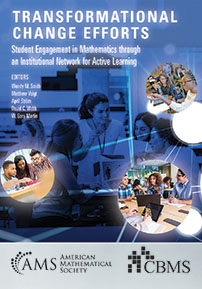APLU Impact
- Creating models for a national push to reform math instruction.
- Studying and scaling the implementation of active learning to dramatically increase student success in introductory math courses, which are foundational to the study of STEM fields.
- Through a National Science Foundation grant, over 120 math faculty at 26 institutions are studying the implementation of active learning on their campuses to dramatically increase student success in introductory math courses.
- SEMINAL handbook published in 2021 helps mathematics departments improve student outcomes.
Student Engagement in Mathematics through an Institutional Network for Active Learning (SEMINAL) is a National Science Foundation-funded effort to better understand how to sustain success in implementing active learning in undergraduate mathematics classes and how to influence similar success at other institutions. With a $3.8 million, five-year grant, APLU is partnering with three lead institutions (University of Colorado Boulder; University of Nebraska-Lincoln; and San Diego State University) and 23 additional universities to study how to drive institutional change.
Collaborating for Innovation
Entry-level math remains one of the biggest barriers to student success overall for undergraduate degrees, and particularly for STEM majors. Nationally, 25 to 50 percent of students fail their first math class, with another 50 percent of students in STEM majors switching out of those fields after struggling in math. Yet schools that have adopted active learning in entry-level math have achieved remarkable increases in student success. Students in active learning courses earn higher course grades by half a letter grade and students in classes with traditional lectures were 1.5 times more likely to fail.
Through SEMINAL, faculty are collaborating with APLU to better understand how to effectively implement active learning and related changes in undergraduate math and how to drive wider adoption of active learning methods in higher education. The work was initiated through the Mathematics Teacher Education Partnership (MTEP) initiative. SEMINAL’s purpose is to help change agents, those looking to (or currently attempting to) enact change within mathematics departments and beyond—trying to reform the instruction of their lower division mathematics courses in order to promote high achievement for all students.
SEMINAL Handbook Available Now!
“Transformational Change Efforts: Student Engagement in Mathematics through an Institutional Network for Active Learning” is available for purchase now at the American Mathematical Society bookstore. The purpose of this handbook is to help department chairs, deans, and mathematicians launch institutional transformations in mathematics departments to improve student success. We report findings from Phase I of the SEMINAL project and provide insights into the conditions, strategies, interventions and actions at the departmental and classroom levels that contribute to the initiation, implementation, and institutional sustainability of active learning in undergraduate calculus across varied institutions. (Print ISBN: 978-1-4704-6377-9; Electronic ISBN: 978-1-4704-6453-0)
“This is the “how to” book for department leaders who recognize the need to move toward active learning or simply want to know more about what it would involve. The SEMINAL project began by studying these six departments. In Phase II it added nine more departments that wanted to initiate active learning, seeking to take the lessons described in this report and seeing how they could be applied to help those beginning this process. SEMINAL is already moving on to Phase III, now bringing in an additional twelve departments to apply what they have learned.” – David Bressoud, Director of the Council Board of the Mathematical Sciences; MAA Blog, “How to Transform a Department of Mathematics”




Stay Connected
X (formerly Twitter)
Facebook
YouTube
LinkedIn
RSS